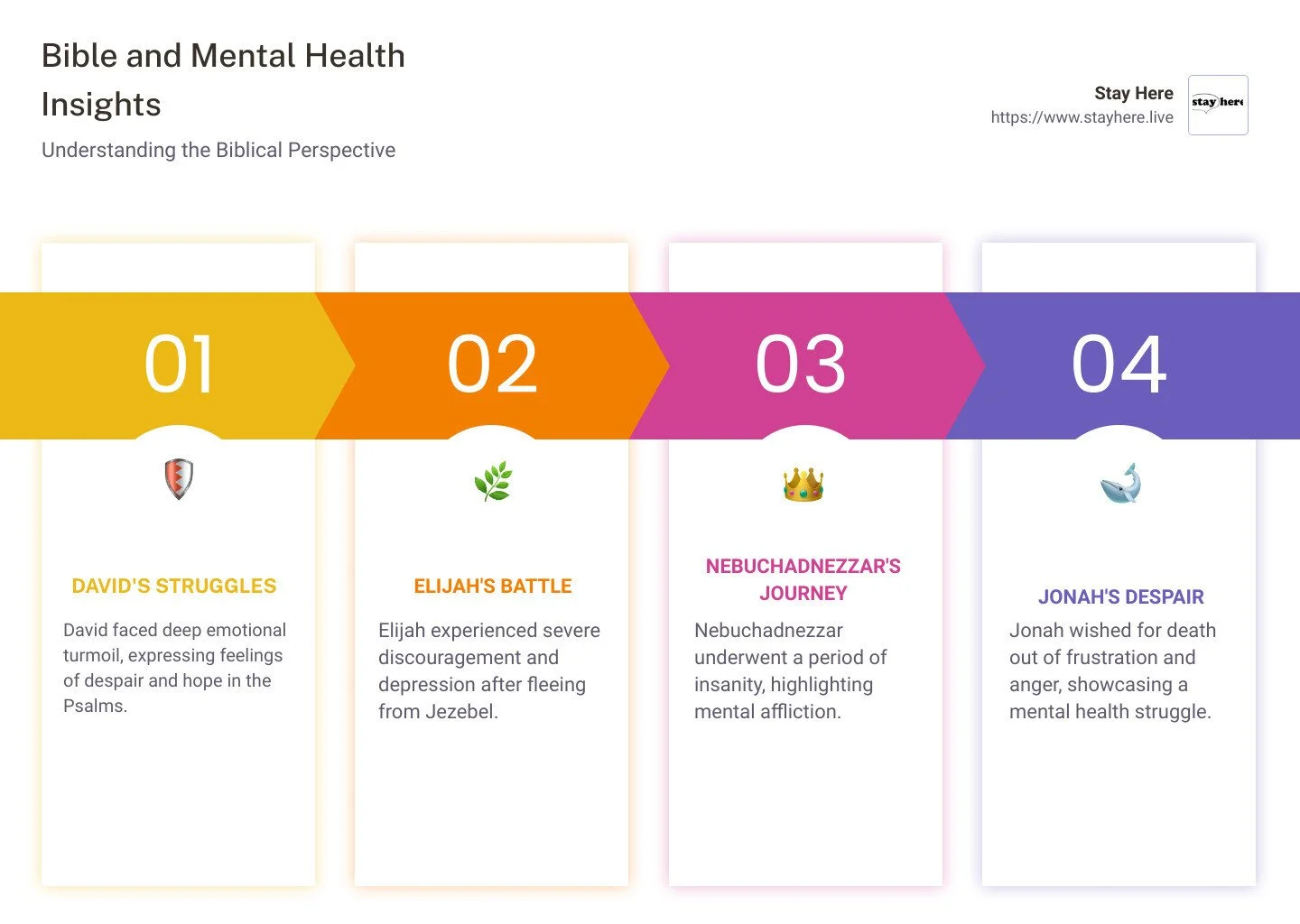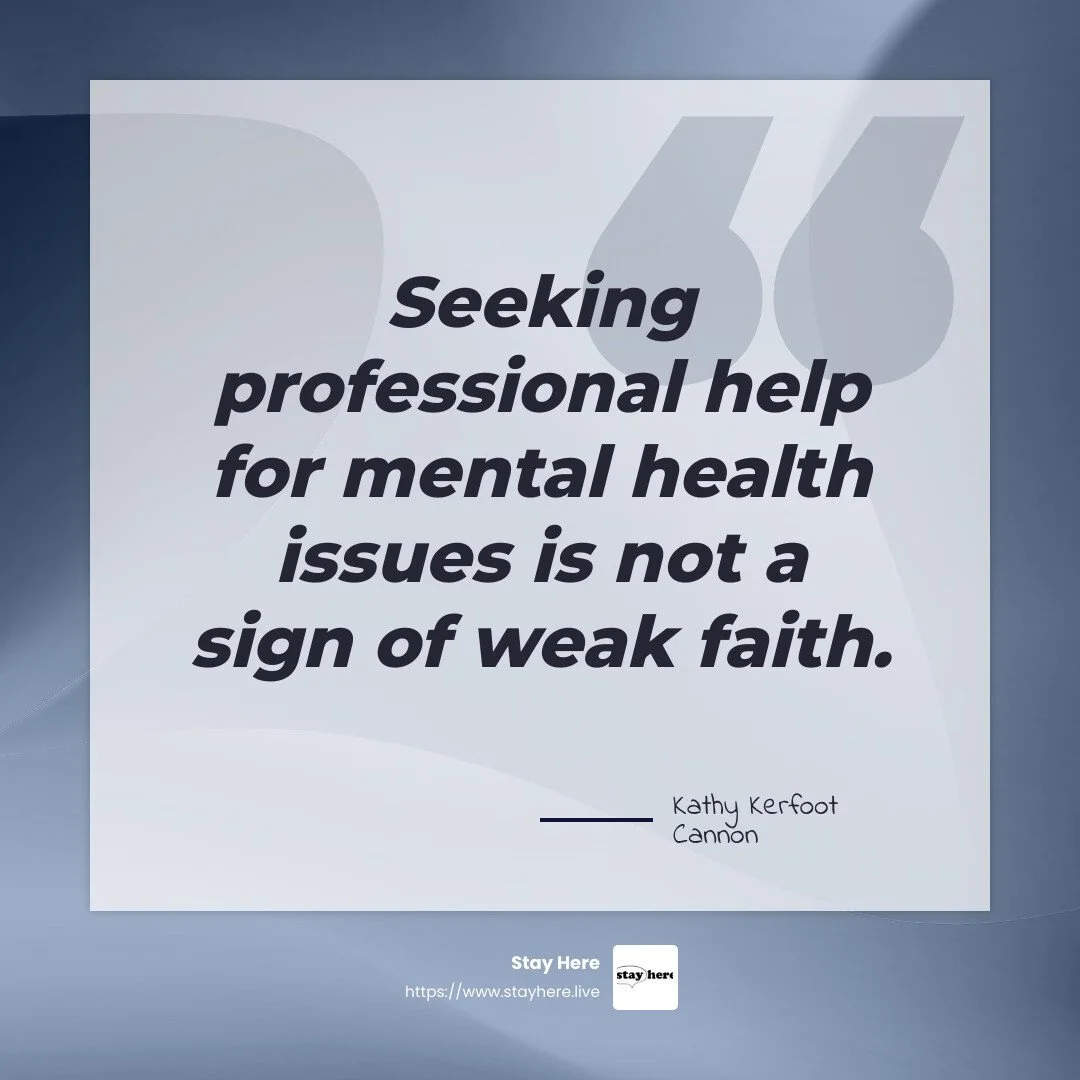When Faith Meets Mental Health: Biblical Stories
Intersection of Faith and Mental Health
Bible and mental disorders often intertwine through rich stories and teachings, offering profound insights still relevant today. While the Bible doesn't explicitly mention modern terms like depression or anxiety, many stories reflect struggles akin to mental health issues. Characters like David, Elijah, and Nebuchadnezzar experienced deep emotional and psychological challenges, showing that such struggles are as ancient as they are human.
Stigma and faith coexist but can be reconciled.
Scripture offers guidance and solace for those suffering.
Faith can be an anchor and a source of strength during mental trials.
Historically, mental illness has been met with stigma and misunderstanding. However, the Bible, when interpreted with empathy and insight, can present a supportive framework that acknowledges these challenges while promoting healing. Faith demands compassion and understanding, not dismissal or blame.
As Jacob Coyne, a speaker and founder of Stay Here, I have dedicated my life to explaining the complexities surrounding bible and mental disorders. My work, inspired by personal faith and professional experience, seeks to uncover these narratives to offer hope and healing to those in need. Let’s explore how biblical teachings and modern mental health can walk hand in hand.
Biblical Perspectives on Mental Disorders
The Bible provides a window into the emotional and mental struggles faced by many of its characters. These stories, while ancient, resonate with modern experiences of mental health challenges. Let's take a closer look at David, Nebuchadnezzar, and Elijah—three figures who grappled with profound psychological trials.
David: The Troubled King
David, known as a man after God's own heart, faced numerous personal trials that affected his mental well-being. He experienced betrayal, loss, and intense pressure. In the Psalms, David often expressed deep feelings of despair and anguish, which many today would recognize as symptoms of depression.
For instance, in Psalm 6:6-7, David writes:
"I am worn out from my groaning. All night long I flood my bed with weeping and drench my couch with tears. My eyes grow weak with sorrow; they fail because of all my foes."
These verses reveal David's emotional turmoil and his reliance on faith to cope with his distress.
Nebuchadnezzar: The Humbled Ruler
King Nebuchadnezzar's story offers a dramatic example of mental illness affecting a powerful figure. In Daniel 4, Nebuchadnezzar is struck with a form of madness as a result of his pride and defiance against God. He lived like a wild animal for a period, losing his sanity and status.
This episode highlights the belief that mental struggles can be a humbling experience, leading to personal change. Nebuchadnezzar's eventual recovery and acknowledgment of God's sovereignty illustrate a journey from madness to redemption.
Elijah: The Despondent Prophet
Elijah, a mighty prophet, also faced moments of deep despair. After a great victory over the prophets of Baal, Elijah found himself fearing for his life due to threats from Queen Jezebel. Overwhelmed, he fled into the wilderness and prayed for death, saying:
“I have had enough, Lord,” he said. “Take my life; I am no better than my ancestors” (1 Kings 19:4 NIV).
Elijah's story is one of exhaustion and isolation, yet it also demonstrates divine care. God provided Elijah with rest, nourishment, and a renewed sense of purpose, showing that even in our darkest moments, support and recovery are possible.
A Shared Human Experience
These stories of David, Nebuchadnezzar, and Elijah remind us that mental health struggles are not new. They are part of the human condition, experienced by people of faith throughout history. The Bible, through these narratives, offers comfort and the assurance that we are not alone in our struggles.
By examining these biblical perspectives, we can find empathy and understanding, reducing the stigma often associated with mental disorders within faith communities. This approach encourages compassion and support for those facing similar challenges today.
Next, we'll dig into how these stories impact our understanding of Bible and Mental Disorders: Key Stories, exploring more narratives that resonate with our modern experiences of mental health.
Bible and Mental Disorders: Key Stories
The Bible is rich with stories of individuals who faced mental and emotional struggles, providing insights into mental disorders and their impact on people's lives. Let's explore the experiences of Elijah, David, Jonah, and Naomi to see how their stories resonate with modern mental health challenges.
Elijah: The Overwhelmed Prophet
Elijah, a revered prophet, experienced significant emotional turmoil. After his triumph over the prophets of Baal, he was threatened by Queen Jezebel and fled in fear. In his despair, he asked God to take his life:
“I have had enough, Lord,” he said. “Take my life; I am no better than my ancestors” (1 Kings 19:4 NIV).
Elijah's story is one of exhaustion and isolation. Yet, it also shows divine care as God provided him with rest and nourishment. This highlights the importance of support and recovery, even in our darkest moments.
David: The Despairing King
David, celebrated as a man after God's own heart, faced immense personal challenges. His life was marked by betrayal, loss, and pressure. In the Psalms, David often expressed feelings of despair and anguish, similar to depression symptoms:
"I am worn out from my groaning. All night long I flood my bed with weeping and drench my couch with tears" (Psalm 6:6-7 NIV).
David's reliance on faith to steer his emotional struggles offers a timeless example of finding solace in spirituality during times of distress.
Jonah: The Reluctant Prophet
Jonah's story is a classic tale of reluctance and consequence. After disobeying God's command, Jonah found himself in a dire situation, swallowed by a great fish. This experience left him deeply distressed and regretful:
Jonah's depression stemmed from his poor decision-making and the overwhelming circumstances that followed.
His eventual obedience and the fulfillment of his mission illustrate the potential for growth and healing after periods of mental and emotional struggle.
Naomi: The Grieving Mother
Naomi's life was filled with loss and sorrow. After the death of her husband and sons, she returned to her homeland with her daughter-in-law, Ruth. Naomi's grief was so profound that the townspeople barely recognized her:
Naomi's story demonstrates how trauma and loss can profoundly affect one's mental state.
Her journey with Ruth toward rebuilding their lives provides hope and a testament to resilience in the face of adversity.
These biblical stories of Elijah, David, Jonah, and Naomi offer valuable insights into the human experience of mental health challenges. They remind us that such struggles have existed throughout history and highlight the importance of compassion and support within faith communities.
Next, we'll explore how these narratives help in Addressing Stigmas in Faith Communities, encouraging understanding and empathy for those facing mental health issues today.
Addressing Stigmas in Faith Communities
Faith communities often grapple with stigmas surrounding mental health. Let's address common misconceptions about weakness, sin, surrender, and prayer in the context of mental disorders.
Weakness
One common stigma is that mental illness is a sign of weakness. This belief is contrary to many biblical teachings. For instance, the Apostle Paul speaks of embracing weakness in 2 Corinthians 12:9-10:
“My grace is all you need. My power works best in weakness.”
Paul's message reminds us that vulnerability can be a source of strength. Recognizing our limitations allows us to rely more on God's strength rather than our own. Embracing our struggles and seeking help is not weakness but wisdom.
Sin
Another misconception is that mental illness is a result of sin. This view is not supported by biblical narratives. In fact, the Bible does not equate mental health struggles with sin. As seen in the story of Elijah, mental distress was met with compassion and care, not condemnation.
Throughout scripture, God addresses sin and mental health differently. For example, when Moses disobeyed God, he faced direct consequences (Numbers 20). However, mental health issues, like those experienced by Elijah or David, were met with support and understanding.
Surrender
Some believe that surrendering mental illness to Jesus will solve the problem entirely. While faith can be a powerful component of healing, it should not be seen as the sole solution. Faith communities must recognize the role of professional help alongside spiritual practices.
Brittany Jones, a worship leader, exemplifies this balance. Her church, Motivation Church, partners with counseling services to support mental health, showing that faith and professional help can coexist harmoniously.
Prayer
Prayer is often seen as the ultimate remedy for mental health issues. While prayer is a vital part of spiritual life, it should not replace other forms of treatment. Donald A. Lichi emphasizes that while prayer is important, God may also work through medication and therapy.
Faith communities should encourage prayer as part of a holistic approach to mental health, alongside medical and therapeutic interventions. This approach fosters a supportive environment where individuals can seek comprehensive care without judgment.
By addressing these stigmas, faith communities can become places of refuge and support for those facing mental health challenges. Understanding and empathy can replace judgment, fostering a culture of compassion and healing.
Next, we'll dig into The Role of Faith in Mental Health Treatment, exploring how spiritual practices can complement professional care for holistic healing.
The Role of Faith in Mental Health Treatment
Faith can play a significant role in mental health, offering tools like spiritual coping and spiritual meaning-making that can support holistic healing. Let's explore how these practices can complement traditional treatments.
Spiritual Coping
Many people turn to their faith as a way to cope with mental health challenges. This doesn't mean they see their mental illness as purely spiritual. Instead, they integrate spiritual practices with other treatments.
For example, individuals might engage in prayer, meditation, or attend religious services as part of their routine. These practices can provide comfort and a sense of community. One participant in a study noted:
"I am at my healthiest when I have regular therapy... and when I also have regular spiritual direction."
This highlights how spiritual coping works alongside medical treatments like therapy or medication, not as a replacement.
Spiritual Meaning-Making
Another way faith supports mental health is through spiritual meaning-making. This involves finding purpose or positive outcomes from difficult experiences.
For some, mental health struggles deepen their faith and empathy. They might feel closer to God or more equipped to help others. One person shared:
"All the experiences I have had with symptoms of depression have worked together to deepen my faith."
However, it's crucial to note that this doesn't romanticize suffering. The benefits come through the struggle, not because of it.
Holistic Healing
Combining faith with professional mental health care can lead to holistic healing. This approach respects the complexity of human beings, acknowledging that we are physical, emotional, and spiritual.
Faith-based organizations, like Motivation Church, often partner with mental health professionals. This collaboration shows that spiritual and medical treatments can coexist and improve each other.
Faith communities can support holistic healing by providing resources like support groups, workshops, and access to counselors. Encouraging members to seek both spiritual and medical help can foster a more comprehensive and compassionate approach to mental health.
Next, we'll tackle some Frequently Asked Questions about Bible and Mental Disorders, addressing common questions and misconceptions about how faith and mental health intersect.
Frequently Asked Questions about Bible and Mental Disorders
What does the Bible say about mental illnesses?
The Bible doesn't address mental illness directly as we understand it today. However, it does mention states of mind and emotional struggles. For instance, Deuteronomy 28:28 warns of "madness and confusion of heart" as consequences of rebellion. This reflects the historical context rather than a direct commentary on mental health.
The Bible also tells stories of individuals who faced significant emotional and psychological challenges. These narratives show that mental struggles are part of the human experience, not a modern phenomenon.
Who in the Bible had mental health issues?
Several biblical figures showed signs of mental distress:
Elijah was overwhelmed and wished for death after fleeing from Queen Jezebel (1 Kings 19:4). His story highlights exhaustion and despair.
David often expressed deep sorrow and depression in the Psalms. For example, in Psalm 6:6-7, he wrote about weeping and being worn out from groaning.
Nebuchadnezzar, the Babylonian king, experienced a period of madness, living like a wild animal until he acknowledged God's sovereignty (Daniel 4:31-32).
Naomi faced profound grief and loss, leading to a deep sense of bitterness and identity change (Ruth 1).
These stories illustrate that even those close to God experienced mental and emotional struggles.
Can you be a Christian and seek a counselor?
Absolutely. Seeking professional help for mental health issues is not a sign of weak faith. Just as you would see a doctor for a physical ailment, it's wise to consult a mental health professional for emotional or psychological struggles.
Kathy Kerfoot Cannon, a pastor who has been open about her mental health journey, emphasizes that Christians should view mental health struggles like any other health issue. She advocates for normalizing conversations about mental health within faith communities.
Faith and counseling can work hand in hand. Many Christians find that integrating their spiritual beliefs with professional therapy leads to holistic healing. It's important to choose a counselor who respects your faith and can incorporate it into your treatment plan if that is important to you.
Seeking help is a courageous step towards healing, and it aligns with the biblical principle of caring for the whole person—body, mind, and spirit.
Conclusion
At Stay Here, we believe in the power of hope and healing. Our mission is rooted in the vision of a suicide-free generation, and we are committed to supporting individuals on their journey to mental wellness. By blending spiritual strength with practical mental health resources, we offer a holistic approach that acknowledges both the emotional and spiritual aspects of well-being.
Hope is a central theme in the Bible and is essential in overcoming mental health challenges. Scriptures like Psalm 34:17-18 remind us that the Lord is near to the brokenhearted and saves those who are crushed in spirit. This message of hope is a cornerstone of our work at Stay Here. We encourage individuals to draw strength from their faith while seeking the support they need.
Healing is a journey, not a destination. It involves acknowledging the struggles, seeking help, and finding peace within ourselves and with God. At Stay Here, we provide resources, such as suicide prevention training and a 24-hour crisis chat line, to guide you along this path. Our approach is rooted in the understanding that mental health issues are complex and require a comprehensive strategy that includes professional counseling and spiritual support.
We invite you to explore our church resources to learn more about how faith and mental health can intersect in meaningful ways. Whether you're a part of a faith community or seeking support as an individual, know that you are not alone. Together, we can face the challenges of mental health with courage and hope.
Stay with us on this journey. Every step you take towards wellness is a testament to your strength and resilience. Let's continue to support one another, drawing from the wisdom of scripture and the power of community.



